

![[Crassulaceae] Sempervivum montanum- Mountain Houseleek (Semprevivo montano). [Crassulaceae] Sempervivum montanum- Mountain Houseleek (Semprevivo montano).](https://blogger.googleusercontent.com/img/b/R29vZ2xl/AVvXsEiW_AEeN5y64kXhPWAw5l9f2oGe-e7pbO5rzZxbEJ8W1eAeNNWyvr3AJFvK179k4qFqaN9amFk9K65cG2l-gHPNiNf2S_re6spDWCqxIGHJTJnNLb_0lGSflP8_43Wss-u1JT6sZWaoHw/s400/Flora+-+%255BCrassulaceae%255D+Sempervivum+montanum+2.JPG)
![[Lamiaceae] Ajuga pyramidalis – Pyramidal Bugle (Iva piramidale). [Lamiaceae] Ajuga pyramidalis – Pyramidal Bugle (Iva piramidale).](https://blogger.googleusercontent.com/img/b/R29vZ2xl/AVvXsEi7-oPpa_kk1cs8CiShHWwWBIsvlJEsQS4C2C-46jHBG-2jkYstEd8c5BVhoO03TzRCFyYl_1Lj79Z74AWa7ZBHPkzghp0WxLPTX8OXYAORoX-0fDgFdztMAIeO3gygPv99TNG5KgMeFg/s400/Flora+-+%255BLamiaceae%255D+Ajuga+pyramidalis+2.JPG)
![[Lentibulariaceae] Pinguicula vulgaris – Common Butterwort (Erba unta comune). [Lentibulariaceae] Pinguicula vulgaris – Common Butterwort (Erba unta comune).](https://blogger.googleusercontent.com/img/b/R29vZ2xl/AVvXsEh1mH778RzIY4APhMvwxKvUtQGxjIX2nAIMSpeAPiloJM8uo89Kd6E2aGiGaNoGXZ3dfXPmFXNSsMp4J0Ni0UF7K_Evqn2FS7-EhETMUuQlElxWVeSORJ7_MQVWt7vwbIN05RqrLXoWrw/s400/Flora+-+%255BLentibulariaceae%255D+Pinguicula+vulgaris+2.JPG)
Upper Left: Approaching Capanna Lago Nero under ominous skies.
Upper Right: Trail (sentiero) 268 with our starting and stopping point.
Lower Left: [Crassulaceae] Sempervivum montanum- Mountain Houseleek (Semprevivo montano).
Lower Middle: [Lamiaceae] Ajuga pyramidalis – Pyramidal Bugle (Iva piramidale).
Lower Right: [Lentibulariaceae] Pinguicula vulgaris – Common Butterwort (Erba unta comune).
Overview
Length: 8 km (5 mi)
Duration: 5.5 hours total, with 45 minute lunch break at Capanna Lago Nero
Elevation: 1200 m (3,937 ft) @ start/end of hike at Ristoro Cinque Laghi; 1,997 m (6,551 ft) @ Capanna Lago Nero – highest point
Location: Italy, Lombardy, Bergamo, Alta Val Seriana
Details
Today’s hike to Cinque Laghi (Five Lakes) followed sentiero 268. We started higher and ended sooner than the respective start and end of the trail as documented on the CAI site. A loop around the lakes is a considered one of the classic hikes of Bergamo. However, we were hiking in a group of six and most of the group didn’t want to continue farther on the trail or go for a loop around the lakes due to the threat of rain and the desire to leave early to avoid valley traffic. Therefore, Travelmarx was overruled and hence “short” in this post’s title. For what we didn’t get to do in terms of length was certainly made up with interesting flowers we saw.
To be precise, our turnaround point was Capanna Lago Nero @
1997 m (6552 ft), which is on the little lake, Lago Canali. We sat outside and ate
sandwiches prepared with cheese from our Parafulmine
hike two days earlier. But we were still hungry and ordered polenta with melted cheese (polenta con
formaggio alla piastre) and a simple pasta dish. Everything tastes better
after hiking.
This hike is dominated by the large pipe that transports
water from the alpine lakes to the hydroelectric plant in the valley, Centrale
Enel Di Aviasco, which produces energy for about 10,000 homes. According to the
Bergamo
Post, only two of the lakes (Lago Nero and Lago Aviasco) are used to
produce energy. During the hike, you pass over and under the pipe several
times. In Italian, the pipe is referred to as a condotta forazata.
Flora
As usual, we used the resources listed in the post Resources for Identifying Plants around Bergamo for helping figure out what is what. If we had to give an accuracy score for our identifications, we say about 95% accurate for species and 98% for genus.
Key: [Family] Genus species – Common name in English (Common name in Italian)
[Violaceae] Viola
biflora – Yellow Violet (Viola con
due fiori)
[Asparagaceae] Paradisea
liliastrum – St Bruno’s Lily (Giglio
di monte)
[Boraginaceae] Myosotis
– Forget Me Not (Nontiscordardimè)
[Campanulaceae] Phyteuma
hemisphaericum – Globe Headed Rampion (Raponzolo
alpino)
- A Phyteuma definitely, but which one is a kind of hard to know. P. hemispheericum is more common and is found at slightly lower elevations. For these reasons, we went with P. hemisphaericum.
[Crassulaceae] Sempervivum
montanum- Mountain Houseleek (Semprevivo
montano)
[Ericaceae] Rhododendron
ferrugineum – Alpenrose (Rododendro
rosso)
[Fabaceae] Laburnum
anagyroides – Common Laburnum (Maggiociondolo)
[Gentinanaceae] Gentiana
clusii – Trumpet Gentian (Genziana di
Clusius)
- Based on absence of green inside of corolla.
[Lamiaceae] Ajuga
pyramidalis – Pyramidal Bugle (Iva
piramidale)
[Lentibulariaceae] Pinguicula
vulgaris – Common Butterwort (Erba
unta comune)
[Orchidaceae] Dactylorhiza
maculata – Spotted Heath Orchid (Orchide
macchiata)
[Orchidaceae] Orchis
mascula – Early Purple Orchid (Orchide
maschio)
[Polygalaceae] Polygala
chamaebuxus – Shrubby Milkwort (Poligala
falso bosso)
[Primulaceae] Primula
daonensis – (Primula della Valle di
Daone)
[Ranunculaceae] Pulsatilla
alpina – Alpine Pasqueflower (Pulsatilla
alpina)
[Rosaceae] Sanguisorba
spp. – Burnet (Salvastrella) [just
leaves]
[Thymelaeaceae] Daphne
striata – Striped Daphne (Dafne
striata)

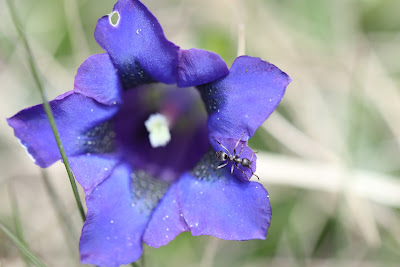
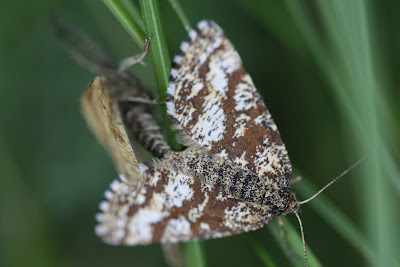

Left: An ant nest on trail 268. We saw many in the forested part of the hike. Center Left: An ant on a gentian flower. Center Right: Two moths mating. Right: A spider protecting her brood?
![[Asparagaceae] Paradisea liliastrum – St Bruno’s Lily (Giglio di monte). [Asparagaceae] Paradisea liliastrum – St Bruno’s Lily (Giglio di monte).](https://blogger.googleusercontent.com/img/b/R29vZ2xl/AVvXsEiMpTnyEVKnPplt2JzWtqUBio6Bk_as1Lnb3sOEWabyDQ6lmtJ688dXEXYXnXhqd7v9zO9aulQHQyJRRJz3vYzEhtQduak-annwTXrT2MHskg3G243lcQEEITLfuge5LAbv5Cqp13Xrjg/s400/Flora+-+%255BAsparagaceae%255D+Paradisea+liliastrum+2.jpg)
![[Asparagaceae] Paradisea liliastrum – St Bruno’s Lily (Giglio di monte). [Asparagaceae] Paradisea liliastrum – St Bruno’s Lily (Giglio di monte).](https://blogger.googleusercontent.com/img/b/R29vZ2xl/AVvXsEgsiYJDMkagxU5GUdZEi54jfd8L3fNVMjW2BdktUQt3ATK4gX6L9wXhWPLvtD_y4seLAOXxSHbL_AWgktgAIfbmoNzzl6JUeLWTL7iMmiVxvvGTWBnd7GLCfEW4ctIAfe5bBY51k-pPfA/s400/Flora+-+%255BAsparagaceae%255D+Paradisea+liliastrum.JPG)
![[Boraginaceae] Myosotis – Forget Me Not (Nontiscordardimè). [Boraginaceae] Myosotis – Forget Me Not (Nontiscordardimè).](https://blogger.googleusercontent.com/img/b/R29vZ2xl/AVvXsEh8tLpIHGpyUkDqebRYgHIRSvaBe8k0VBTQPMF3FrdpPDaOQ8KXtWy4bw6bvuQ_Bjka20z3BXrByeD2qmg4DIAXJORhz_uFcr_NnV7Jk3GW8TSEMJ_Pe7Y7Ie3Wj_AjhyphenhyphenV314CylZCrjg/s400/Flora+-+%255BBoraginaceae%255D+Myosotis.JPG)
![A spider on an [Asteraceae] Centaurea flower bud. A spider on an [Asteraceae] Centaurea flower bud.](https://blogger.googleusercontent.com/img/b/R29vZ2xl/AVvXsEhlqzCt1_TOhGGh2oKbzMAWZMInPRXIBsxcUNIXsELtgtiISvW4rV8q4hZhycLIVs2LV38IPOH24wQC-lVbpbR1XzoacAJ41BGYkIj2nZLn_oVPjWb9T7OeOSPqyxHfA5aBLmZzUEf_sQ/s400/Fauna+-+Spider+on+Centaurea+flower+bud.JPG)
Left and Center Left: [Asparagaceae] Paradisea liliastrum – St Bruno’s Lily (Giglio di monte). Center Right: [Boraginaceae] Myosotis – Forget Me Not (Nontiscordardimè). Right: A spider on an [Asteraceae] Centaurea flower bud.
![[Crassulaceae] Sempervivum montanum- Mountain Houseleek (Semprevivo montano). [Crassulaceae] Sempervivum montanum- Mountain Houseleek (Semprevivo montano).](https://blogger.googleusercontent.com/img/b/R29vZ2xl/AVvXsEiNAIFUTY10fLS9u8lLzIz5IILG0cbNt88iEYBwUUy21v3mow1s8P1LzQwi_s4PnAnStvabExf1U44Sa4PzcZsR3xlg7OIbOABptNF0BUwWzHmijGYbrQ-9HXs3SV4pP7aRQfrKPJX8xg/s400/Flora+-+%255BCrassulaceae%255D+Sempervivum+montanum.JPG)
![[Ericaceae] Rhododendron ferrugineum – Alpenrose (Rododendro rosso). [Ericaceae] Rhododendron ferrugineum – Alpenrose (Rododendro rosso).](https://blogger.googleusercontent.com/img/b/R29vZ2xl/AVvXsEhT3ZuQ8ZTndNoILLPdaXjiLVe1Fv6m-sTdSUsM9fHBPsxKP_l4wHo8kCm2ct0TqeFVxmTt5eNdbM7GmkwH2UZmqV1BaNFHZLSyC5uKecPuMjkyVzHNZ1Kroqi38dyAcTaAlOGOZAR29w/s400/Flora+-+%255BEricaceae%255D+Rhododendron+ferrugineum.jpg)
![[Fabaceae] Laburnum anagyroides – Common Laburnum (Maggiociondolo). [Fabaceae] Laburnum anagyroides – Common Laburnum (Maggiociondolo).](https://blogger.googleusercontent.com/img/b/R29vZ2xl/AVvXsEj4Qlpj1r4vWq2iFdPW5DeM7ek1QRtnSE0FfXHy6M6efxb3bI_kMw2wZ8zvSwiktNkah8nVGrFyqTkYfXFUo4zkkR3C2NQ1EbKSds0LM-XQzB0DgO61KAcOQ5BLsEQTpUE7tTfmDdCfqw/s400/Flora+-+%255BFabaceae%255D+Laburnum+anagyroides.JPG)
Left: [Crassulaceae] Sempervivum montanum- Mountain Houseleek (Semprevivo montano). Center: [Ericaceae] Rhododendron ferrugineum – Alpenrose (Rododendro rosso). Right: [Fabaceae] Laburnum anagyroides – Common Laburnum (Maggiociondolo).
![[Gentinanaceae] Gentiana clusii – Trumpet Gentian (Genziana di Clusius). [Gentinanaceae] Gentiana clusii – Trumpet Gentian (Genziana di Clusius).](https://blogger.googleusercontent.com/img/b/R29vZ2xl/AVvXsEgJoFEfZd9mSCEAt95J9r2odsg4BlKaqnycUYUjvY-UpGqBT8i-cD7pITAvH0U6rbJAVjohRPvCmIAnl4PzokzZuI7SjkTHtAghEe333-E53f6y3U9jm72BYopQrwBfH93lL8W6-Paayw/s400/Flora+-+%255BGentinanaceae%255D+Gentiana+clusii.jpg)
![[Lentibulariaceae] Pinguicula vulgaris – Common Butterwort (Erba unta comune). [Lentibulariaceae] Pinguicula vulgaris – Common Butterwort (Erba unta comune).](https://blogger.googleusercontent.com/img/b/R29vZ2xl/AVvXsEjGz2cg7vhXB-HVi57tmbUUU5NR-rxLSEjpXoDz0NUsriTz5SFo9BOwFgkR6GsQgaysQTSoWbOkFqyMnaJlZsmPiKo2KdigYhD5qSnjn_0dx10q4JK11bx9tZGdhC1V2vaAzzjMyWf4Tw/s400/Flora+-+%255BLentibulariaceae%255D+Pinguicula+vulgaris.jpg)
![[Polygalaceae] Polygala chamaebuxus – Shrubby Milkwort (Poligala falso bosso). [Polygalaceae] Polygala chamaebuxus – Shrubby Milkwort (Poligala falso bosso).](https://blogger.googleusercontent.com/img/b/R29vZ2xl/AVvXsEgJnZzrxIqIlVZP8_bltrbm17567ENDvjsTD-aErUlS0iaSUU5mULWzDnn6fuZo5SZoYEYZ9V4SK15JwSKZsYbdcGLWEZZrL4cR2q4HAAQ8JuvsYlVxS24QHKZvzj_F3VzSAKRD2Mj2CA/s400/Flora+-+%255BPolygalaceae%255D+Polygala+chamaebuxus.jpg)
Left: [Gentinanaceae] Gentiana clusii – Trumpet Gentian (Genziana di Clusius). Center: [Lentibulariaceae] Pinguicula vulgaris – Common Butterwort (Erba unta comune). Right: [Polygalaceae] Polygala chamaebuxus – Shrubby Milkwort (Poligala falso bosso).
![[Orchidaceae] Dactylorhiza maculata – Spotted Heath Orchid (Ochide macchiato). [Orchidaceae] Dactylorhiza maculata – Spotted Heath Orchid (Ochide macchiato).](https://blogger.googleusercontent.com/img/b/R29vZ2xl/AVvXsEjvYOQrjZGjRUBeByPUggqs7azoqdtaIOm0ykCIThgQCJ7WZCeAMcrc-j0ZQHp0d_7cWeS3k0NeawWs2I0BpAOY3SW8phC1TcPpUFfPdB32tDAwPRTpT9AUHkomUOdzxvA6ZCRIb29n0w/s400/Flora+-+%255BOrchidaceae%255D+Dactylorhiza+maculata.jpg)
![[Orchidaceae] Orchis mascula – Early Purple Orchid (Orchide maschio). [Orchidaceae] Orchis mascula – Early Purple Orchid (Orchide maschio).](https://blogger.googleusercontent.com/img/b/R29vZ2xl/AVvXsEgnTuyBJdydFeeFJCW4leTbOJsACdKi8OOL_jQQMIue8wA3P2CCc7jy6r5nPxw2U1P3eGglKddcqUBKA2Q6A8m31E5uA_zCti4mMOkFGlWGwRpBvEQzgiUxI0UB6cjKCT11_PPM9jKMKw/s400/Flora+-+%255BOrchidaceae%255D+Orchis+mascula.jpg)
![[Lamiaceae] Ajuga pyramidalis – Pyramidal Bugle (Iva piramidale). [Lamiaceae] Ajuga pyramidalis – Pyramidal Bugle (Iva piramidale).](https://blogger.googleusercontent.com/img/b/R29vZ2xl/AVvXsEgg8-6spegf8YwIOcRJjwEaKIWKKONo0dUwyJWEKnUYU4GEqjvP1FM5x_lk699ye7affZIYDWox9T7fRZau-gXADduWRVrkfKaTgOnZGHZf5Dw7JZh4Tm8dwsOiT5SvegsthbvJOZZ06Q/s400/Flora+-+%255BLamiaceae%255D+Ajuga+pyramidalis.jpg)
Left: [Orchidaceae] Dactylorhiza maculata – Spotted Heath Orchid (Ochide macchiato). Center:
[Orchidaceae] Orchis mascula – Early Purple Orchid (Orchide maschio). Right: [Lamiaceae] Ajuga pyramidalis – Pyramidal Bugle (Iva piramidale).
[Orchidaceae] Orchis mascula – Early Purple Orchid (Orchide maschio). Right: [Lamiaceae] Ajuga pyramidalis – Pyramidal Bugle (Iva piramidale).
![[Ranuculaceae] Pulsatilla alpina – Alpine Pasqueflower (Pulsatilla alpina). [Ranuculaceae] Pulsatilla alpina – Alpine Pasqueflower (Pulsatilla alpina).](https://blogger.googleusercontent.com/img/b/R29vZ2xl/AVvXsEi_Qu6v4nqhunw6ku0bjx-JDlCaZ6ljrXvUIY-aSf0X1NAdCz9T71TRrggYfX-JEdp6ODThCSxp6y1rmD5icPcOesV2Cj1cOA25ZmB4v0kY_9xYgsWeUWRBkOYETdZs1LwZ-MlsViR0NQ/s400/Flora+-+%255BRanuculaceae%255D+Pulsatilla+alpina.JPG)
![[Violaceae] Viola biflora – Yellow Violet (Viola con due fiori). [Violaceae] Viola biflora – Yellow Violet (Viola con due fiori).](https://blogger.googleusercontent.com/img/b/R29vZ2xl/AVvXsEhXlRBSQ8YmMEZafZw9uXIsacWDLuDM27bMUNGtItAhC-tZusC8vpCw-DSEjiRjtpN7WqFoX8v-5ctAQ57ohOkQy8s1XaANPuWbDWFFiDy53UK2QqtONBaolnK1dGI1qW6sQ-U2wjN_qA/s400/Flora+-+%255BViolaceae%255D+Viola+biflora.jpg)
![Detail of [Rosaceae] Sanguisorba spp. – Burnet (Salvastrella) leaf. Detail of [Rosaceae] Sanguisorba spp. – Burnet (Salvastrella) leaf.](https://blogger.googleusercontent.com/img/b/R29vZ2xl/AVvXsEgVlZDYktG9vE5C4tSnfcU8CuvPm28YgAqxts7s5Ufwb-qADSBU0FY3P88fXMhu55XVhUtRtFMGBdhOJ1cgqF_3lBQQoG_2wtC-teHwFEKHYgIgHDDau7-oZKa4LU7yyvntBdOtNqgr6Q/s400/Flora+-+%255BRosaceae%255D+Sanguisorba.JPG)
Left: [Ranunculaceae] Pulsatilla alpina – Alpine Pasqueflower (Pulsatilla alpina). Center: [Violaceae] Viola biflora – Yellow Violet (Viola con due fiori). Right: Detail of [Rosaceae] Sanguisorba spp. – Burnet (Salvastrella) leaf.
![[Primulaceae] Primula daonensis – (Primula della Valle di Daone). [Primulaceae] Primula daonensis – (Primula della Valle di Daone).](https://blogger.googleusercontent.com/img/b/R29vZ2xl/AVvXsEi_Au9gOSj0bn_buffL_51_hbxCPElX4CpTc7E1Jdh9CouhY70n7KnwsB8ebT54LS7jcQegSIftx7EUxwvA5KPHg7Tx8qwoOE8uqj3JW-rZpJZBOINr89T6hXIErLbYrr67DcQcbPV7CQ/s400/Flora+-+%255BPrimulacease%255D+Primula+daonensis+2.JPG)
![[Primulaceae] Primula daonensis – (Primula della Valle di Daone). [Primulaceae] Primula daonensis – (Primula della Valle di Daone).](https://blogger.googleusercontent.com/img/b/R29vZ2xl/AVvXsEhm3eT33Ylb6PzOPX3Ab8oWM82ZD-a94i8tNe0iKkh_-fEGFyA1Si7WAm0qkxFXLc1gLVyuvXvkXwB0Sbp1PxfDxJOB8gxYev_b_CCw96_UMVHKWwdfYF8J6g2eAmQDCdjkOWuJIAKjfg/s400/Flora+-+%255BPrimulacease%255D+Primula+daonensis.jpg)
![[Thymelaeaceae] Daphne striata – Striped Daphne (Dafne striata). [Thymelaeaceae] Daphne striata – Striped Daphne (Dafne striata).](https://blogger.googleusercontent.com/img/b/R29vZ2xl/AVvXsEjFyizYxhaSF7yqBTe-1msntVtB01VIpKn5fvw5-jIbOkVLckWaulLOD2WWO3nUHmhwg9Gp4bah1dluGtoJdJw9gkRDLGo1GfSctVNgiJDJmexWXqCDfBMKn-08GJKxWys8V7kTyIiYyw/s400/Flora+-+%255BThymelaeacease%255D+Daphne+striata+2.JPG)
![[Thymelaeaceae] Daphne striata – Striped Daphne (Dafne striata). [Thymelaeaceae] Daphne striata – Striped Daphne (Dafne striata).](https://blogger.googleusercontent.com/img/b/R29vZ2xl/AVvXsEixXRexybfFmCMd2gv38d-TCvIH-nPADEiYGjkCosrnZUhG8n1gmmE3xqSTXtpVsf6zXcfsNg3L1E8UvwbPYCRQISn9v8_TMrZUDRFkWe0MVxQ2zwRbvcrlwA5297AxP7l1TDvKJd1ezQ/s400/Flora+-+%255BThymelaeacease%255D+Daphne+striata.jpg)
Left and Center Left: [Primulaceae] Primula daonensis – (Primula della Valle di Daone). Center Right and Right: [Thymelaeaceae] Daphne striata – Striped Daphne (Dafne striata).
![[Campanulaceae] Phyteuma hemisphaericum – Globe Headed Rampion (Raponzolo alpino). [Campanulaceae] Phyteuma hemisphaericum – Globe Headed Rampion (Raponzolo alpino).](https://blogger.googleusercontent.com/img/b/R29vZ2xl/AVvXsEh59jFGQh8kq0w5l3zxwCAJM15Q8QyAFpdY2wqV09IWeVHMpTgIR_NVMhiiKp15p3qcIIGv0Pvy6-qb3Zf81BAyqSL4GpFZCaq1RgAQuAFMRyGXaGKgn7aFJPGW52eZnE6GLDI9zcktOw/s400/Flora+-+Raponzolo+2.JPG)
![[Campanulaceae] Phyteuma hemisphaericum – Globe Headed Rampion (Raponzolo alpino). [Campanulaceae] Phyteuma hemisphaericum – Globe Headed Rampion (Raponzolo alpino).](https://blogger.googleusercontent.com/img/b/R29vZ2xl/AVvXsEiJ6BJSc15Lp7n1rXlBCXKbK1ZrFtkKSNj2OcwYWjSW7_lPvBwouvN2ccfZFNS4MNmTako0Rsy7TLmOfQB1IERPgm-jcb2WPflK9RWp6nrstGa-rPzVrYLNSW4SBEeAqffbeh7mfVJxSw/s400/Flora+-+Raponzolo+3.jpg)
![[Campanulaceae] Phyteuma hemisphaericum – Globe Headed Rampion (Raponzolo alpino). [Campanulaceae] Phyteuma hemisphaericum – Globe Headed Rampion (Raponzolo alpino).](https://blogger.googleusercontent.com/img/b/R29vZ2xl/AVvXsEiW4lPO0drVtR28q8lHbX9LxwXIgUD8WsZ1pfvWDLwJuwKIyljo8CHXOU17A_4eqXNpoP8Qg5v6_FMqZiMYsgiFZOfnqHZQgvnjvX0SJD5fBuX7ysvEbMurjGls8BJ1P3VJWJFQGQmVQw/s400/Flora+-+Raponzolo.JPG)
All three photos: [Campanulaceae] Phyteuma hemisphaericum – Globe Headed Rampion (Raponzolo alpino).

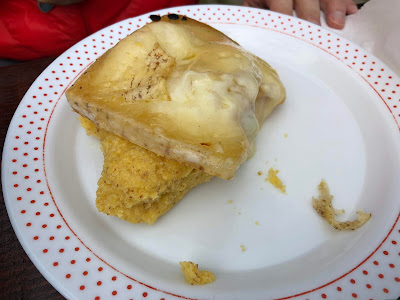
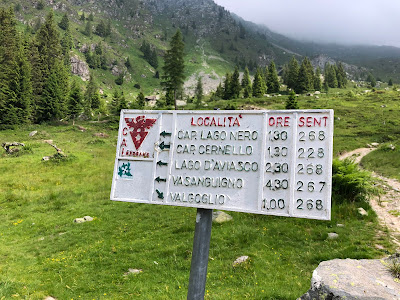
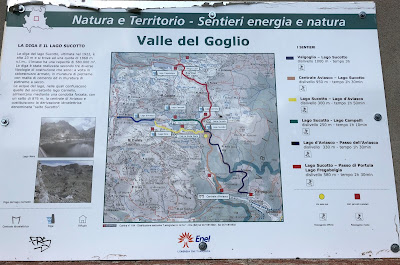
Left: Pasta at Capanna Lago Nero. Center Left: Polenta with melted cheese (polenta con formaggio alla piastre). Center Right and Right: Signs along trail 268 to Cinque Laghi.

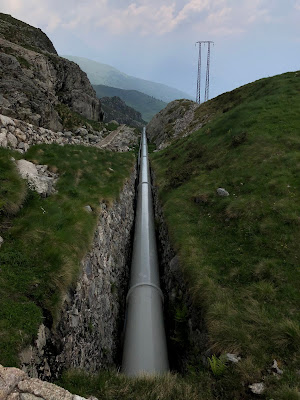

Scenes from the trail 268 with the ever-present water pipe bringing water from two of the alpine lakes down to the Valgoglio hydroelectric plant in the valley.



Views from the trail 268. Left: Looking down to the valley. Center: The ENEL village. Right: Start of the hike at Ristoro dei Cinque Laghi.
No comments:
Post a Comment
All comments are moderated. If your comment doesn't appear right away, it was likely accepted. Check back in a day if you asked a question.